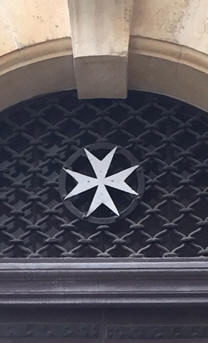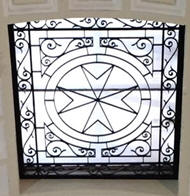Catholic Medical Quarterly Volume 67(2) May 2017
Faith in Medicine
The Maltese Cross.
A brief overview of its symbolic meaning for
healthcare professionals
Donato Tallo
 The
Maltese Cross with its four prominent arms and eight distinctive points is
a cross that both rich in meaning and rich in history and it is most
definitely a cross that is well worth exploring in some detail. Despite
the fact that the Maltese Cross has its origins in eleventh century Amalfi
in Italy, the cross was formally adopted as the symbol of the Knights
Hospitallers of St John also in the eleventh century. The Knights
Hospitallers of St John is certainly an organisation that springs
to mind when one sees the Maltese Cross. As well as having been associated
for many centuries with the Knights Hospitallers of St John the Maltese
Cross has various other associations most noticeably with the Sovereign
Military Order of Malta, St John Ambulance and the Island of Malta itself.
The
Maltese Cross with its four prominent arms and eight distinctive points is
a cross that both rich in meaning and rich in history and it is most
definitely a cross that is well worth exploring in some detail. Despite
the fact that the Maltese Cross has its origins in eleventh century Amalfi
in Italy, the cross was formally adopted as the symbol of the Knights
Hospitallers of St John also in the eleventh century. The Knights
Hospitallers of St John is certainly an organisation that springs
to mind when one sees the Maltese Cross. As well as having been associated
for many centuries with the Knights Hospitallers of St John the Maltese
Cross has various other associations most noticeably with the Sovereign
Military Order of Malta, St John Ambulance and the Island of Malta itself.
While so much can be explored in relation to the cross itself the core symbolic meaning attributed to both the arms and the points of the cross by the Knights of St John has a terrific amount to teach us as healthcare professionals. However before exploring the arms and the points it is important to note that in its original form as the symbol of the Knights Hospitallers the cross is always white on a black background. The fact that the cross is white is of great importance to us as Christians as white is the colour of heaven, the colour of Our Lord the spotless Lamb, it is the sign of purity and is the colour that along with gold is used liturgically to celebrate feasts of Our Lord.
The Arms
For the hospitaller brothers of the Order of St John the four arms of the cross symbolise the four cardinal Virtues, namely prudence, justice, temperance and fortitude. For us as individuals working in the healthcare professions we need to strive to embody these values on a daily basis in our healthcare practice, these values are not values exclusively for people who believe in God but are values that are open to all people. Within our often rushed and stressful working environments it is important we never forget at the heart of what we do are individual patients all of whom are individual human beings worthy of respect, love, care and attention. In a world that is becoming ever more commercialised and narcissistic there has never been a greater time for those who are sick and also those who may feel alone or unloved to be valued with ever more increasing urgency and sincerity. If we as healthcare professionals choose to embody these four values in our daily working lives then we will not be anything special or amazing but simply good hardworking professionals trying to do our best for others, those in need, those close to those in need and our colleagues and others we may come into contact with. If we embody these values then we will be honest, integral, kind, courageous, compassionate and safe in what we do, moreover we will be sensible and thoughtful putting the needs of those in need before our own.
The Points

With regard to the eight individual points on the Maltese Cross there
is some universal disagreement on what each point stands for. However the
original version is generally understood to be the eight Beatitudes. The
eight Beatitudes which Jesus taught in his Sermon on the Mount can be
found in chapter five of Matthew’s Gospel: blessed are the poor in spirit;
for theirs is the kingdom of heaven, blessed are those who mourn; for they
shall be comforted, blessed are the meek; for they shall inherit the
earth, blessed are those who hunger and thirst for righteousness; for they
shall be satisfied, blessed are the merciful; for they shall obtain mercy,
blessed are the pure in heart; for they shall see God, blessed are the
peacemakers; for they
 shall be called the children of God, blessed are
those who suffer persecution for righteousness sake; for theirs is the
kingdom of heaven.
shall be called the children of God, blessed are
those who suffer persecution for righteousness sake; for theirs is the
kingdom of heaven.
The Beatitudes teach us that true happiness comes from being truly humble and not from any over inflated ideas of self importance or pride, moreover they teach us to put all our confidence in God alone who is the true source of all life. For us in the healthcare professions the Beatitudes remind us that we must constantly seek to be truly humble. Further to this the Beatitudes also link in nicely with the idea that it is better to give than to receive and giving is something that we as healthcare professionals do all of the time, we give ourselves, our time, our talents and our skills and we must always remember to be humble, honest and integral the giving of ourselves to others, we must remember to share our talents and our skills and to use them wisely for the benefit of others in just and integral manners.
A symbol that is worthy of much deeper reflection than this brief overview, the Maltese Cross is a beautiful sign of faith, hope and love and one that is built on strong virtues and morals that those of us working within the healthcare professions should seek to embody within our daily healthcare practice and lives as a whole.
Donato Tallo is a registered nurse working in the acute hospital sector
